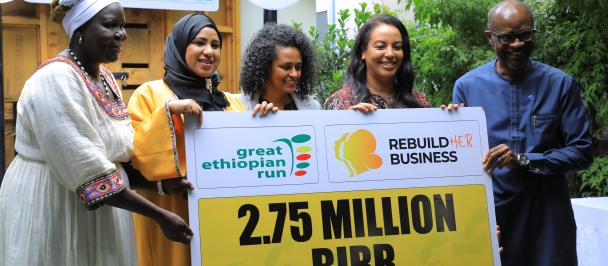Canada’s Department of Foreign Affairs, Trade and Development (DFATD) has signed a 5.8 million USD grant (6.5 million Canadian dollar) with UNDP Ethiopia to build the entrepreneurial capacity of around twenty-five thousand Ethiopian women and female youth.
The support will be provided through an Entrepreneurship Development Programme (EDP), which was officially launched by Prime Minister Hailemariam Desalegn in early 2013. The EDP seeks to support entrepreneurship development and job creation in the country by increasing the competitiveness and profitability of the Ethiopia’s micro and small enterprises (MSEs), especially those owned by women and youth.
“Tapping into the innovative drive of entrepreneurs, particularly women and youth, is the cornerstone of UNDP’s strategy to help Ethiopia unleash the potential of the private sector to drive the country’s development agenda forward,” said Eugene Owusu, UNDP Ethiopia Resident Representative. “We are delighted to have this partnership with the Government of Canada”.
The partnership with Canada will help to strengthen the support targeted towards women’s economic empowerment through entrepreneurship training and access to customized business development service.
Female entrepreneurs in Ethiopia face a number of challenges including accessing resources such as land, education, and effective business networks. In the rural areas, women face further challenges when looking for employment in the formal sector, even though they have acquired technical skills through vocational training. Many women who do find formal jobs tend to be underemployed. According to the 2013 National Labor-force Survey, national figures for employment at a managerial level puts women’s participation at five times less than that of their male counterparts while women make up the majority of those holding low end occupations. The story is different when it comes to the informal sector which accounts for 23.1% of all working women while only 14.7 % of working men are drawn into this sector.
“Canada is proud to help create jobs by promoting the growth of small businesses in Ethiopia, especially businesses owned by women,” said Christian Paradis, Canadian Minister of International Development and La Francophonie. “By giving businesses market access, and by encouraging investment, innovation, training, and trade, we stimulate economic growth in developing countries, and we contribute to reducing poverty.
The Entrepreneurship Development Programme supports Ethiopia to address these bottlenecks by not only providing women with vocational skills but also building their knowledge base, ambitions in business, and encouraging self-employment.
More specifically, through its main interventions, the project is expected to contribute in improving the profitability and competitiveness of up to 35,000 small and micro enterprises; create up to 200,000 new jobs generated by small and micro enterprises; increasing accessibility of business development services in Ethiopia through the establishment of five entrepreneurship development centers; and to foster better collaboration between the public and private sector in addressing business constraints.
Since the launch of the EDP in 2013, the Entrepreneurship Development Centre has rolled out the programme to four regions, provided trainings for 1,154 entrepreneurs (356 of whom were women), while 570 entrepreneurs and MSEs in Addis Ababa and regions have accessed Business Development Support (BDS). The EDP supports the capacity development of Technical Vocational Education and Training (TVET), public universities, and Centres of Excellence for Entrepreneurship which will provide customized entrepreneurship development training to university students, with a specific focus on female students.

current selection
UNDP Ethiopia
Find Our Offices Around the World.
Get in touch, share your ideas, and discover how we can work together for a sustainable, just, and equitable future.
current selection
UNDP Ethiopia
Go to GLOBAL SITEAfghanistan
Albania
Algeria
Angola
Argentina
Armenia
Asia and the Pacific
Azerbaijan
Bahrain
Bangladesh
Barbados
Belize
Benin
Bhutan
Bolivia
Botswana
Brazil
Burkina Faso
Burundi
Cape Verde
Central African Republic
Chad
Chile
Colombia
Comoros
Congo (Dem. Republic of)
Congo (Republic of)
Cook Islands, Niue, Samoa and Tokelau
Costa Rica
Côte d'Ivoire
Cuba
Cyprus
Denmark
Dominican Republic
Ecuador
El Salvador
Equatorial Guinea
Eritrea
Eswatini
Ethiopia
Europe and Central Asia
European Union
Finland
Gabon
Gambia
Geneva
Germany
Ghana
Global Centre for Technology, Innovation and Sustainable Development in Singapore
Global Policy Centre for Governance
Guatemala
Guinea
Guyana
Haiti
Honduras
India
Indonesia
Iran
Istanbul International Centre for Private Sector in Development
Jamaica
Japan
Jordan
Kenya
Kosovo (as per UNSCR 1244)
Kuwait
Lao PDR
Lesotho
Liberia
Libya
Madagascar
Malawi
Malaysia
Maldives
Mali
Mauritania
Mauritius & Seychelles
Mexico
Mongolia
Montenegro
Morocco
Mozambique
Myanmar
Nairobi Global Centre on Resilient Ecosystems and Desertification
Namibia
Nepal
Nicaragua
Niger
Nigeria
North Macedonia
Norway
Pacific Office
Pakistan
Panama
Papua New Guinea
Paraguay
Peru
Philippines
Programme of Assistance to the Palestinian People
Rome Centre
Rwanda
São Tomé and Principe
Senegal
Sierra Leone
Somalia
South Africa
South Sudan
Sri Lanka
Sudan
Suriname
Sweden
Syria
Tajikistan
Tanzania
Thailand
Timor-Leste
Togo
Trinidad and Tobago, Aruba, Curacao and Sint Maarten
Tunisia
Uganda
Ukraine
United States of America
Uruguay
Venezuela
Viet Nam
Zambia
Zimbabwe

 Locations
Locations


